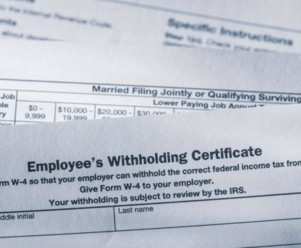How Long Does A Temp Contract Last? - What to Know
By Davis Clarkson , July 21 2023

For many short and long-term projects, employers will often rely on temporary workers – which are typically hired through agencies – to meet deadlines.
Through hiring ‘temps’, companies are provided with more flexibility, whereby they don’t have to offer the regular benefits that come with regular employment.
The specific length of a temporary contract can differ between employers; however, that being said, they can last between weeks and years depending on the requirements.
With this in mind, this article will explore everything you need to know about temporary contracts, as well as how long they typically last.
Let’s get straight into it.
Also read: All You Need To Know About Mortgage Interest Tax Deduction

What Are Temporary Jobs?
Rather than hiring a new employee directly through the company, oftentimes, a staffing firm will hire a temporary worker.
Generally, a company and staffing film will work together to hire someone with a particular skill set required for their length of stay – this could be anywhere from a few hours to several months, or even longer!
There is a range of temporary roles in diverse industries, including accounting, manufacturing, administration, information technology, and more.
Whether the role is required as a cover for someone else on maternity leave, to help complete a project, or as a long-term solution for a rapidly growing company, there is a range of reasons why a company may take on temporary roles.
When it comes to the length of a temporary contract, there is really no set time limit – a specific company could require your help for days, weeks, months, or even years –, there is simply a mental limit regarding the length of time a temp can be a temp.
To avoid confusion, companies, and agencies who hire a lot of temps will typically set a specific term length in the contract. This can range from anywhere between six months to 18 months.
That being said, lawyers usually advise companies to keep the contracts as short as possible, this helps to avoid any internal conflicts that may arise.
Also read: 6 Ideas For Employee Appreciation Gifts
What Are ‘Long-Term’ Temporary Positions?
When it comes to short-term temporary positions, these will typically only last a few days or up to a couple of weeks.
However, when a position continues for longer than approximately six weeks, it is then considered to be a long-term temporary position.
In these cases, an employer contracts with a staffing agency to determine how many temp hours or length of time is required for these temporary positions; although, they can be extended if needed.
Some positions can be extended for years or even longer.
Also read: How Do You Negotiate Your Salary?

Contract Dates
Timelines or dates established in a contract will help you determine the duration you’re working. However, there can sometimes be confusion regarding when a contract ends due to misleading information.
-
Any contract that outlines the agreement to last ‘for a year’ but doesn’t highlight a date would be considered an invalid contract.
-
If a contract were to share the project outline but doesn’t specify any dates, then you could be considered unenforceable. This would apply even if the signature is dated. The project required an expected deadline, too.
-
Any dates highlighted must include timeframes. If a signature date is missing, then a party is able to question the contract’s validity.
While dates aren’t legally required, it is beneficial to include them. They can be seen as bad faith when omitted. Moreover, dates will also improve the validity if legal action were to take place.
Also read: The Ultimate 10 Money Saving Apps For Your Personal Finance
Limitations To Temporary Positions
Some government agencies, corporate policies, and state laws establish limitations to the particular length of time you can hold temporary contracts.
Generally, many companies will hold a 1,000-hour guideline. In these cases, if a temp employee were to work for more than 1,000 hours within a 12-month time frame – which is roughly 20 hours a week – then they would be eligible for permanent employment or be eligible for certain company benefits, including a pension plan.
On the other hand, there are some employers with even stricter time frames. For instance, three or six months. This means that temp employees won’t take advantage of the company benefits. However, these are still considered long-term temporary positions.
That being said, there are some protections offered to temporary workers by federal and state laws to permanent employees. For instance, temp workers are protected from retaliation – this means they are protected from both whistleblowing and being fired.
The protections cover retaliation from both staffing agencies and businesses that take advantage of temporary workers.
Also read: The 10 Best Budget Apps You Need To Know
Pros and Cons of Temp Contracts
Temp workers are great for employees looking to bridge the gap between jobs, providing a paycheck to someone while you’re looking for the right person to fill a permanent role.
Likewise, hiring a long-term temporary worker doesn’t necessarily mean they are required to stay the whole duration of employment.
Typically, temp jobs are considered to be ‘at-will’ – meaning you can leave the position at any time, or likewise, the employer can request a replacement for whatever reason, too.
This provides you with the flexibility to work while searching for the right permanent position. That being said, temporary employment rarely includes benefits.
Hence, you need to find your own health insurance and establish your own retirement plan – which can sometimes be hard when you take into account temporary working pay.
In addition to this, permanent employees working the same job will typically make significantly more money than their counterparts. This is somewhat due to staffing agencies taking a cut of what a company pays you.
Final Thoughts…
Generally speaking, there are two types of temporary contracts: short-term and long-term.
Short-term positions can last anywhere between a few days to a couple of weeks. However, once a contract requires more than six weeks, it is considered a long-term contract.
Hopefully, this guide has informed you of everything you need to know about temporary contracts, including the length.
If you ever need to create paystubs when you need proof of income, check out the check stub maker!
Similar Articles
We’ve helped numerous individuals and businesses create professional documents! Create yours today!











